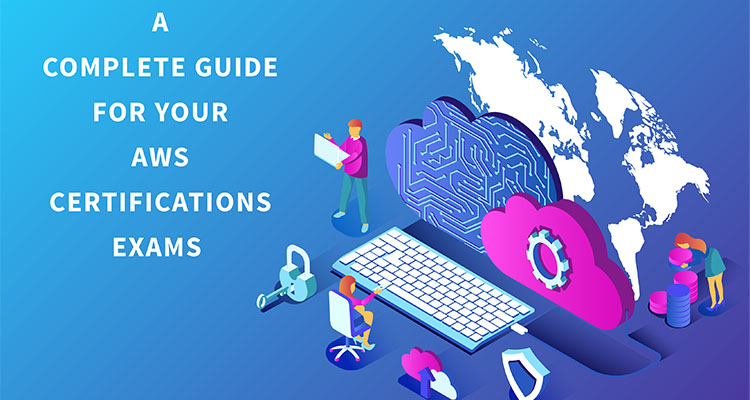Introduction
Most IT professionals are trying to upgrade their skills and the AWS Certification has become essential for greater insight and understanding of the Amazon Web Services like IAM, VPC, EC2 and so on. There are categories of the certification exams that AWS offers. The certification is effective for two years after which it has to be re-certified if needed. Here we explore the various available certifications and how you need to prepare for a specific AWS certification. We also look into the factors you must retain in the course of your preparation.
Choosing the Right AWS Certification
AWS offers role-based & specialty-based certifications. For role-based, AWS certifications can be categorized as Cloud Practitioner, Cloud Architect, Developer roles, Operations roles.
Specialty based certifications can be categorized into advanced technical skills in Networking, Big Data & Security. Look at the following infographic to understand it clearly, and then we’ll look into more details regarding each certification and their learning path.
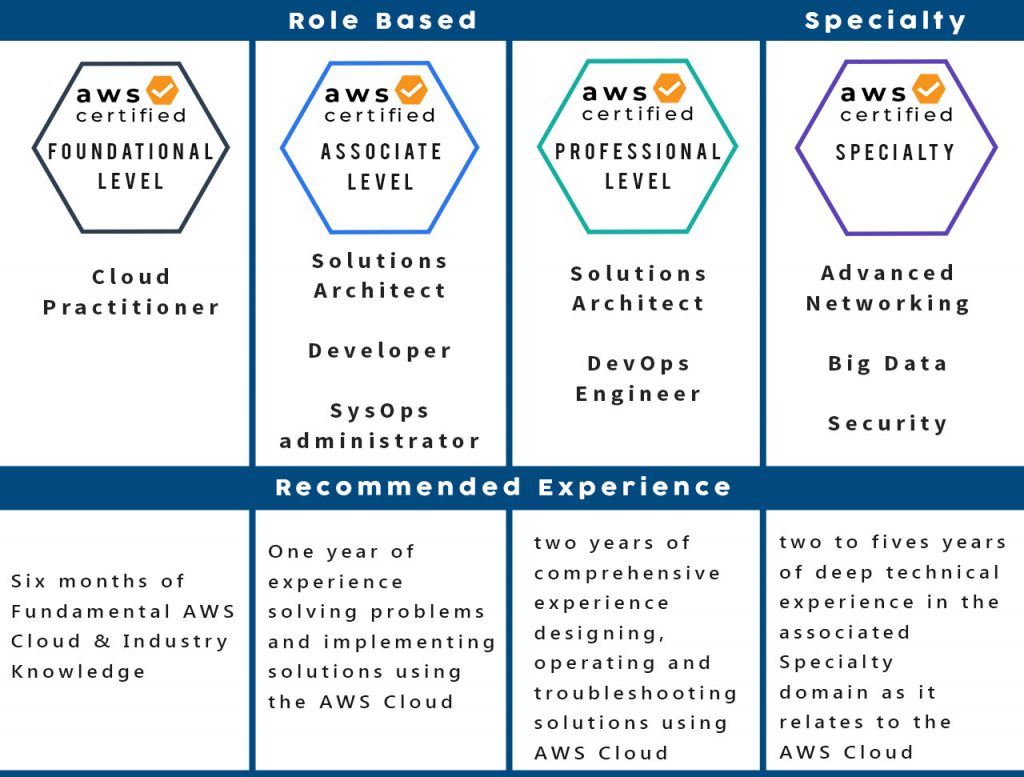
The Associate level exam and the professional level exam both focus on the AWS areas in the primary sense but individually the Associate level exam elaborates on the tools and services while the professional level is focused on multi-group AWS tools and services.
The format for each type of exam either associate, professional or specialty is timed, has multiple choice questions, sample direction question with a heavy focus on AWS services and tools.
One of the necessary steps you would have to take would be to recognize logically which certification is suitable for you. To come to this decision you will want to have to consider the amount of experience you have had in deploying, configuring, and managing computers, network, storage, and database services in AWS. Pick the level of certification according to your level of expertise.
Let’s take a look in brief about these AWS certifications:
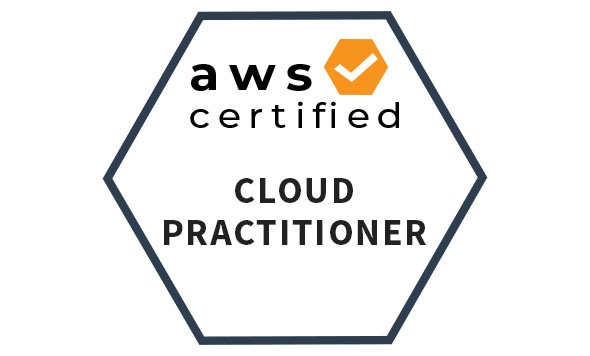
AWS Certified Cloud Practitioner
Independent of a specific technical skill, this certification requires the examinees to have at least six months of experience working in AWS cloud under any kind of role, be it technical, managerial, financial or sales. The basic knowledge requirements are understanding of IT services & how they can be applied using AWS Cloud. It is a recommended path to a specialty AWS certification. The certification assesses a basic understanding of cloud & AWS architecture.
To Practice for the ‘Cloud Practitioner Exam’, Go to AWS Training for ‘Cloud Practitioner’
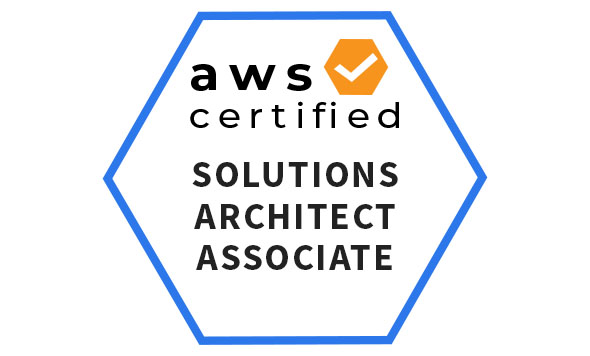
AWS Certified Solutions Architect – Associate
This certification requires examinees to have a year or more of hands-on experience of designing and using fault-tolerant, & scalable distributed AWS system.
The ‘AWS Certified Solutions Architect – Associate’ examination assesses a candidate’s ability on deploying secure & robust applications on AWS. The certification teaches architectural design principles, and implementing best practices in an organization.
To Practice for the ‘Solutions Architect Associate Exam’, Go to AWS Training for ‘Associate – Solutions Architect’
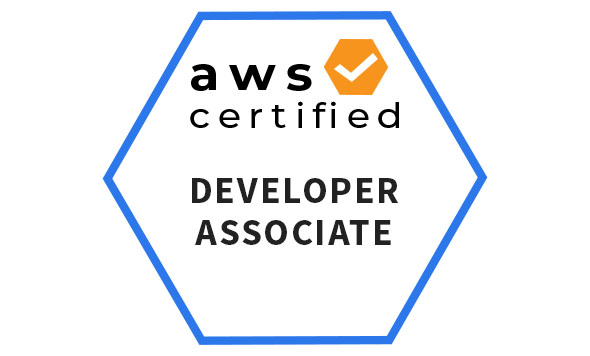
AWS Certified Developer – Associate
Intended for Developers with one or more year of experience in maintaining & developing AWS based applications. One must have in-depth knowledge of at least one high level programming language & must be able to develop, deploy, maintain, and debug applications & modules on AWS. The examiner would also need basic knowledge of AWS architecture.
To Practice for the ‘AWS Developer – Associate’ Exam’, Go to AWS Certified Developer Associate
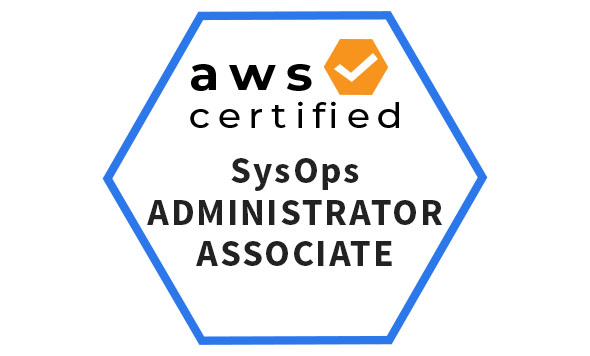
AWS Certified SysOps Administrator – Associate
Requires good knowledge of networking, virtualization technology, & security concepts. The certification validates a candidates’ understanding in deploying, managing & operating scalable systems on AWS. Skills in administration, system management, and security would be of use. The certification requires a year and more of experience as a Systems Administrator.
To Practice for the ‘SysOps Administrator – Associate’ Exam, Go to AWS Training for ‘Associate – SysOps Administrator’
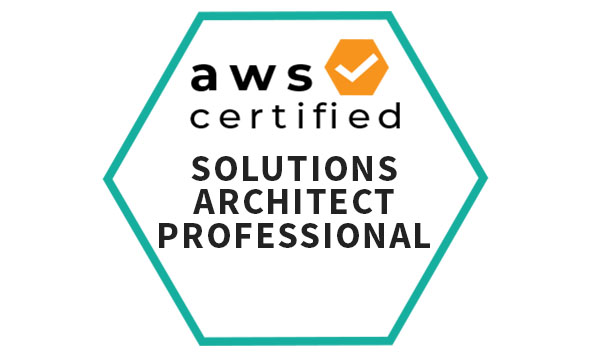
AWS Certified Solutions Architect – Professional
You must have at least two years of experience in designing and deploying AWS cloud architecture. You would be expected to have knowledge of the complex AWS applications. You should be familiar with a scripting language, and with Linux & Windows environment. The certification validates the knowledge in designing & deploying scalable, highly efficient & reliable applications on AWS
To Practice for the ‘Solutions Architect – Professional’ Exam, Go to AWS Training for ‘Professional – Solutions Architect’
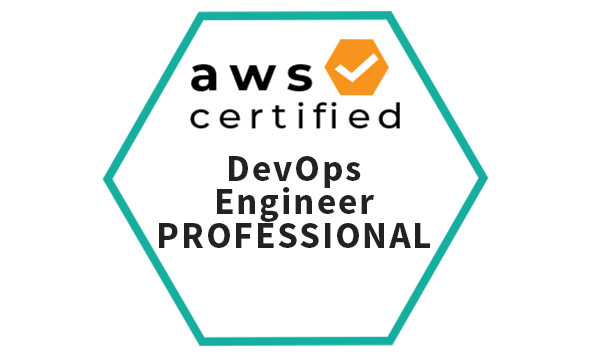
AWS Certified DevOps Engineer Professional
For this certification, it is recommended to have completed the Associate level AWS Certified Developer or AWS Certified SysOps Administrator certification. It would also be a must for you to have two years or more of experience provisioning and managing AWS architecture. Other requirements include proficiency in at least one high-level programming language, experience in automation & testing, and knowledge of agile or other development methodologies. The certification validates complex concepts engaging with continuous deployment and automation of AWS processes and knowledge to incorporate them in AWS architectures.
To Practice for the ‘DevOps Engineer – Professional’ Exam, Go to AWS Training for ‘Professional – DevOps Engineer’
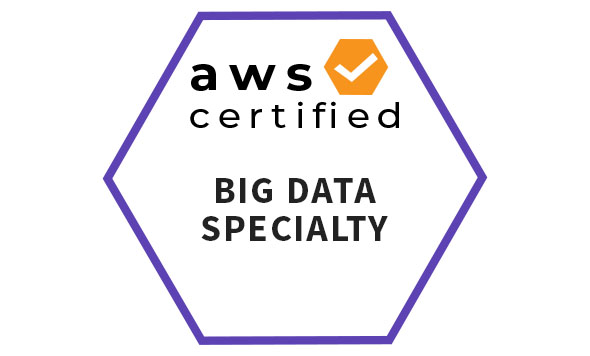
AWS Certified Big Data – Specialty
For this certification, you must have either AWS Cloud Practitioner Certification or at least one of the Associate level certifications. You need five years of experience in data analytics and a background in AWS big data tools and architecture design. The certification validates confirmed technical and experiential skills regarding big data architecture design, implementing AWS tools for automation and other practices.
To Practice for the ‘AWSBig Data – Specialty’ Exam, Go to AWS Training for ‘Specialty – Big Data’
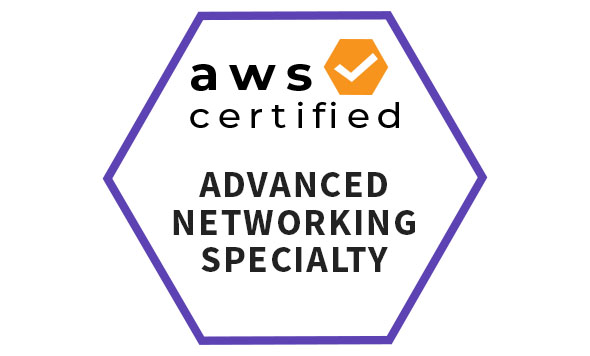
AWS Certified Advanced Networking – Specialty
Like the AWS certified Big Data specialty this certification requires you to have either AWS Cloud Practitioner Certification or at least one of the Associate level certification and five years of experience implementing network architecture & solutions. You would also need advanced knowledge in concepts of AWS networking. To pass the exam you would need to prepare & learn about advanced cloud-based solutions for best networking architecture & practices across all AWS tools and services, & automate networking tasks on AWS.
To Practice for the ‘Advanced Networking – Specialty’ Exam, Go to AWS Training for Specialty – Advanced Networking’
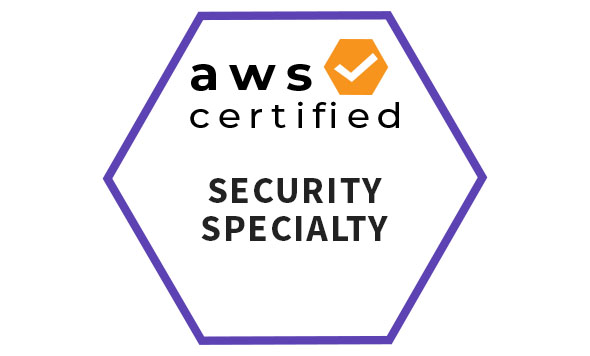
AWS Certified Security – Specialty
Requires a minimum of five years of experience in the IT Security domain & at least two years of experience implementing security solutions for AWS workloads. The certification validates a candidate’s understanding of AWS mechanisms in data protection & encryption, securing internet protocols & working knowledge of AWS security solutions.
To Practice for the ‘Security – Specialty’ Exam, Go to AWS Training for ‘Specialty – Security’
Associate-level exam registration costs $150; Professional- and Specialty-level exam registrations each cost $300. Each registration fee counts for one AWS certification exam.
Learning Paths Offered By AWS
AWS offers learning paths that have recommended courses, labs, and exams for each particular certification. These paths guide in the preparation for the desired certification. It would involve challenging and innovative cases.
Role-Based Learning Paths
Cloud Practitioner
This path is useful for learning AWS fundamentals, getting the overall knowledge of AWS Cloud, developing relevant skills and it is best for individuals in sales, technical and finance roles.

For more information on this learning path read here
Architect
This path has labs, exams, and courses for learning technical skills and how one can design on AWS systems and applications. Since the learning path is for Solution Architect and Design Engineers, or anyone who wants to learn designing systems & applications on AWS; it provides two learning paths:
An Associate level Learning Path and Professional level Learning Path.
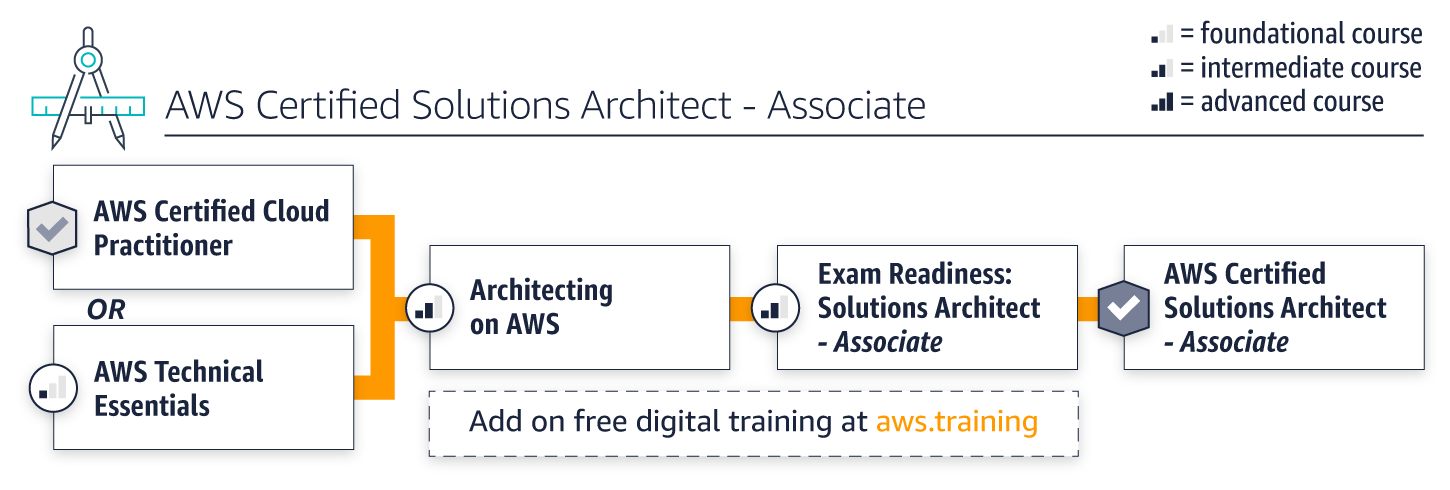
Source: https://aws.amazon.com/training/path-architecting/

Developer
The path is basically for software developers. The courses available are the Developer Associate and DevOps Engineer Professional. The learning path also offers an Associate Level Path & a Professional Level Path which shall explore how one can develop, deploy and maintain cloud applications on AWS.


Operations
This Path is recommended for SysOps Administrators and DevOps role professionals. In this path, one can learn to create an automatable and repeatable deployment of applications, systems, and networks.


Specialty Learning Path
For the advanced skills in the technical spheres of AWS the specialty learning path is available for:
Advanced Networking
It would require advanced technical skills and designing and implementing AWS networks. It would be required of you to be able to design network infrastructure on AWS that is secure and scalable.
Big Data
The course is for Data Scientists, solution architects and anyone in the designing or implementing Big Data cloud solutions. You would have to learn Big Data and basic architecture, value, and potential use cases.
Security
The path is for Security engineers and it would include learning the security services of storage, network, and Data of cloud services.

AWS Training | Preparing for the Exam
For the preparation of any of the above-mentioned certification, you may proceed with these tips:
- Information via official page: The official certification site itself offers a lot of study material. You would need to look into that. Also, you can find all necessary FAQs, white papers and any other information of use.
- Understanding the format and prerequisite: Get a good sense of the format of the certification you prepare for. The format of each type of AWS certification may vary. It would also be of use to find the qualification and prerequisite that you would need to appear for the exam.
- Free tier account: Sign up for the AWS free tier account. Since a practical functional study is far more important than mere reading, this account would avail you with hands-on experience with various AWS services.
AWS White Papers
AWS white papers enlist a list of technical AWS whitepapers that have been prepared by the AWS team and the AWS community. An overview of a few of such critical whitepapers should guide you in your preparation. Some of the important white papers you should go through are:
- Overview of Amazon Web Services
- AWS Well-Architected Framework
- Architecting for the Cloud: AWS Best Practices
- AWS Security Best Practices
- AWS Storage Services Overview
Sample Questions & Mock Tests
An arrangement of five sample exam questions is available on the site. These questions become important because they provide a sense of the questions that appear in the exam. It may not be enough for your practice but it is crucial from the exam’s perspective. For initiating with the certification this should be your first task.
There are various mock test packages available in the market. These mock tests are great for practice and they are far more practical for proper preparation than the twenty-dollar AWS practice exam that contains barely twenty questions. Mock exams will help you in upgrading your score in the exam.
Mock Tests on All AWS Certifications are available here at our site: AWS TRAINING & PRACTICE TESTS
These tests are prepared by industry professionals and would be enough for you to be well prepared before taking your AWS Exam. 100% Money back if not satisfied.
Hands-On Practice
To master the certification you would need hands-on experience such that you build directly in the AWS console using a live working environment. Such step by step labs can be easily availed in the market. Hands-on experience will determine you the level of preparation you have achieved.
Online Discussions & Forums
In getting a full insight on the amount of time the preparation would take you and how you must proceed with the preparation. It is advisable that you talk to some AWS certified professionals who recently took the certification exam. It would also be suggested that you share and discuss your preparation tips with a fellow exam taker.
There are many online forums and platforms available where you can participate in discussions about AWS certification and it’s other aspects. Such engagement would give you insight and keep you updated. You can also interact with professionals in the field and former exam takers.
Watch Video Tutorials
There are various AWS reinvent videos on VPC, RDS, EC2 and more available on YouTube. The visual media will save you time in your preparation and clarify your doubts. It would be of use for you to watch and learn more from these videos.
It would be advised that you pay equal attention to all reference architecture provided by AWS and not reduce your study to just VPC because it is the supposed section from where most questions come from. Some important services to cover would include:
EC2, VPC, RDS, S3, Route53, CloudFront, Cloudwatch, ELB, autoscaling, SWF, SQS, dynamo DB.
Commit to Learning & Fix a Timeline
You must study from the recent and updated material. You can find various articles on AWS available online. Go through the articles to be well informed. Also, the official AWS site must be your constant source for any necessary information.
The AWS tools and services keep expanding with time and the certification exam accordingly changes. It would be smart if you schedule your preparation with a deadline in mind. This would not only channelize your preparation but also be a realistic and pragmatic approach to your preparation.
Amazon requests every candidate to sign up for the Non-Disclosure Agreement (NDA) before they begin with their exam. The exam takers are not permitted to disclose any particulars of the exam such as the number of questions, type of questions, passing score, etc. Amazon further warns that the disclosure of any particular detail mentioned can lead to the cancellation of a candidate’s certification.
Validity & Re-Certification
The AWS certification has a temporary validity which means that your job doesn’t end once you achieve your desired certification. It may occur to you after a couple of years that the certification is not of the same worth anymore. AWS announces new services every now and then. You must remain active and involved in the learning process and stay in tune with the progress in the field so that you can recertify yourself whenever you need it.
The recertification policy of AWS allows a certified candidate to reappear for a rather cheaper and shorter version of the original exam or pursue to upgrade the level of certification to a higher level of professional certification. In order to remain accredited in the IT space, the recertification process is inevitable. Although, upgrading your level of certification is most advisable if you intend to learn more and gain expertise in the field.
Let us know in the comments what you think about the article or approach us for any guidance, suggestions or help

